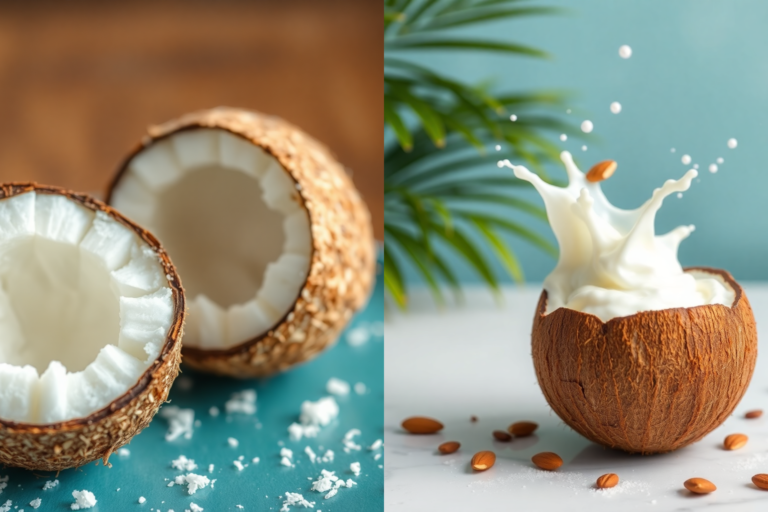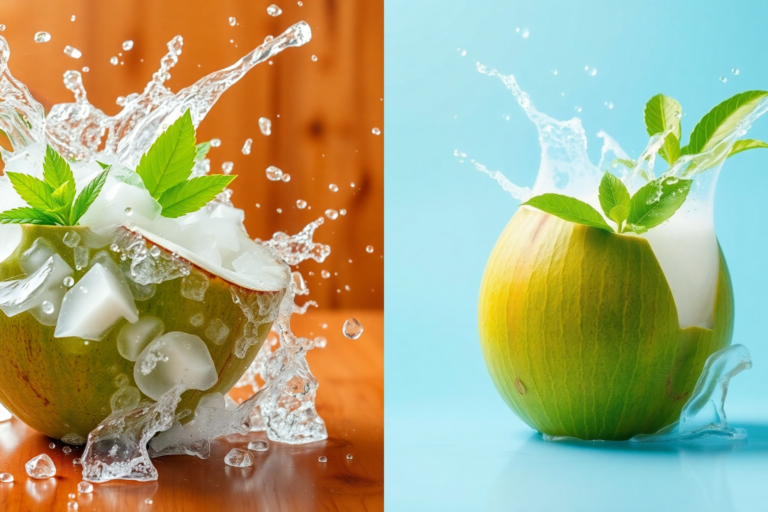Introduction to Coconut Water: Nutritional Facts and Health Benefits
Brief Overview of Coconut Water Nutritional Facts
Coconut water, a clear liquid extracted from young, green coconuts, has gained immense popularity as a natural and refreshing beverage. Unlike coconut milk, which is derived from the grated meat of mature coconuts, coconut water is found inside the fruit and has a naturally light, slightly sweet flavor. It’s celebrated for its hydrating properties and is often marketed as a healthy alternative to sugary sports drinks and sodas. As an increasingly popular choice among health enthusiasts, understanding the nutritional profile of coconut water is crucial for making informed dietary choices.
Importance of Nutrition Facts
Understanding the nutritional benefits of coconut water is essential for those aiming to enhance their health and wellness. By delving into the detailed Coconut Water Nutrition Facts, individuals can make informed decisions about incorporating this beverage into their diet. Coconut water is not just a refreshing drink but also a source of essential nutrients that can contribute to overall health. It is rich in electrolytes like potassium and sodium, which are crucial for maintaining proper hydration and balancing fluids in the body.
The Coconut Water Nutrition Facts also reveal that this beverage provides a modest amount of vitamins and minerals, including vitamin C, calcium, and magnesium. These nutrients play vital roles in supporting immune function, bone health, and muscle function. Additionally, coconut water is low in calories and contains no added sugars, making it a heart-healthy choice for those looking to manage their weight and reduce their intake of processed sugars.
In summary, exploring the Coconut Water Nutrition Facts helps consumers appreciate the natural benefits of this beverage and its role in a balanced diet. By understanding its nutritional profile, individuals can better utilize coconut water as part of a health-conscious lifestyle, ensuring they reap its hydration benefits and nutritional value.
Top 5 Coconut Water Nutrition Facts
1. Rich in Electrolytes
Explanation:
Coconut water is a natural source of essential electrolytes, including potassium, sodium, and magnesium. These minerals are crucial for maintaining fluid balance in the body and supporting various physiological functions. Potassium helps regulate heart function, sodium is vital for fluid balance and nerve function, and magnesium plays a role in muscle and nerve function.
Health Benefits:
The rich electrolyte content in coconut water makes it an excellent choice for hydration, especially during or after exercise and illness. By replenishing these vital minerals, coconut water helps maintain electrolyte balance, which is essential for optimal hydration and overall well-being. Drinking coconut water can effectively prevent dehydration and support recovery after intense physical activity.
2. Low in Calories and Fat
Explanation:
Coconut water is notably low in calories and fat compared to many other beverages. A typical serving contains around 45-60 calories and negligible fat. This makes it a healthier alternative to sugary drinks, sodas, and even some sports drinks.
Health Benefits:
Due to its low calorie and fat content, coconut water is a great option for those looking to manage their weight or maintain a calorie-conscious diet. It provides a flavorful, hydrating alternative without the added sugars and unhealthy fats found in many other beverages. Incorporating coconut water into your diet can help you stay hydrated while keeping your calorie intake in check.
3. Natural Source of Potassium
Explanation:
Coconut water is particularly rich in potassium, an essential mineral that is critical for various bodily functions. A single serving of coconut water can provide up to 15% of the recommended daily intake of potassium.
Health Benefits:
Potassium is crucial for heart health, blood pressure regulation, and muscle function. Consuming adequate potassium helps maintain healthy blood pressure levels, supports proper muscle contractions, and ensures efficient heart function. The high potassium content in coconut water makes it an excellent choice for those looking to boost their potassium intake naturally.
4. Contains Antioxidants
Explanation:
Coconut water contains several antioxidants, including vitamin C and other phytonutrients. These antioxidants help neutralize harmful free radicals in the body, reducing oxidative stress and potential cell damage.
Health Benefits:
The presence of antioxidants in coconut water supports overall health by protecting cells from oxidative damage and inflammation. By incorporating coconut water into your diet, you can benefit from its natural antioxidant properties, which help combat aging, improve immune function, and support overall well-being.
5. Hydrating and Replenishing
Explanation:
Coconut water is renowned for its excellent hydrating properties. It effectively replenishes fluids and essential nutrients lost during physical exertion or illness, making it an ideal choice for rehydration.
Health Benefits:
The natural rehydration capabilities of coconut water make it an effective solution for maintaining hydration levels after exercise, illness, or exposure to hot climates. It not only restores fluids but also provides essential electrolytes, helping you recover faster and stay hydrated throughout the day.
Additional Benefits of Drinking Coconut Water
Supports Digestive Health
How It Helps: Coconut water is not only refreshing but also a beneficial addition to your diet when it comes to digestive health. It contains bioactive enzymes such as amylase, which aid in the breakdown of carbohydrates and facilitate smoother digestion. These enzymes help maintain a healthy gut by promoting the efficient processing of food and reducing the likelihood of digestive discomfort. Incorporating coconut water into your daily routine can contribute significantly to your overall digestive wellness, making it a great choice for those seeking to enhance their digestive health naturally.
Coconut Water Nutrition Facts further emphasize its role in supporting digestion. The natural composition of coconut water, combined with its enzyme content, works in synergy to promote gut health and improve digestion. By understanding the Coconut Water Nutrition Facts, you can appreciate how this hydrating beverage contributes to your digestive system’s efficiency.
Boosts Skin Health
How It Helps: The benefits of coconut water extend beyond internal health; it also plays a vital role in maintaining healthy, radiant skin. Coconut water is rich in hydrating properties that help keep your skin moisturized from within. The electrolytes and vitamins present in coconut water, such as vitamin C and cytokinins, contribute to skin hydration and support the maintenance of a youthful complexion. These nutrients help combat dryness and promote a healthy glow, making coconut water an excellent choice for those looking to enhance their skin health.
When considering Coconut Water Nutrition Facts, you’ll find that the high levels of hydration provided by coconut water directly impact skin health. By integrating coconut water into your diet, you can benefit from its hydrating properties, which contribute to a well-maintained and vibrant complexion.
Aids in Detoxification
How It Helps: Coconut water is renowned for its detoxifying properties, helping to cleanse the body and support overall detoxification. It acts as a natural diuretic, promoting increased urine production that assists in flushing out toxins and waste products from the body. This process helps reduce the burden on the kidneys and supports overall detoxification efforts. By drinking coconut water regularly, you can support your body’s natural detoxification processes and contribute to a cleaner, healthier system.
Understanding the Coconut Water Nutrition Facts reveals how this natural beverage aids in detoxification. The combination of electrolytes and diuretic properties found in coconut water makes it a valuable tool for maintaining a healthy, toxin-free body. Incorporating coconut water into your diet can help enhance your body’s ability to eliminate waste and support your overall health.
How to Incorporate Coconut Water into Your Diet
Daily Intake: Recommendations for Optimal Consumption
Coconut water is celebrated for its refreshing taste and numerous health benefits. To maximize these benefits while avoiding any potential downsides, it’s essential to consume it in appropriate amounts. The general recommendation for daily intake is about 8 to 16 ounces (approximately 240 to 480 milliliters) of coconut water per day. This quantity provides a beneficial amount of electrolytes and nutrients without overloading your system with calories or sugars.
Coconut Water Nutrition Facts reveal that this natural beverage is low in calories, making it an ideal choice for hydration without contributing to weight gain. It’s packed with essential electrolytes like potassium, sodium, and magnesium, which support proper hydration and electrolyte balance. However, it’s important to be mindful of the sodium content in some brands, especially if you are on a low-sodium diet.
Recipes and Uses: Creative Ways to Add Coconut Water to Your Meals
Coconut Water Nutrition Facts underscore its versatility and nutritional value, making it a fantastic ingredient to incorporate into various recipes. Here are some delicious ways to enjoy coconut water:
Smoothies: Adding coconut water to smoothies not only enhances the flavor but also boosts the nutritional profile. Combine coconut water with your favorite fruits like pineapple, banana, or mango for a tropical twist. For a nutritious green smoothie, blend coconut water with spinach, avocado, and a touch of honey.
Cocktails: Coconut water can serve as a refreshing mixer in cocktails. Try it in a tropical mojito or a coconut water-based margarita for a light and hydrating drink. Mix coconut water with lime juice, mint leaves, and a splash of rum for a revitalizing cocktail option.
Soups and Stews: Incorporate coconut water into soups and stews for a subtle coconut flavor and added nutrients. Use it as a base for a coconut curry soup or to deglaze the pan when cooking a flavorful stew.
Ice Pops and Frozen Treats: Freeze coconut water in ice pop molds for a hydrating and naturally sweet frozen treat. You can also mix coconut water with fruit puree for an extra burst of flavor.
Salads and Dressings: Use coconut water as a base for light and refreshing salad dressings. Combine it with olive oil, vinegar, and herbs for a nutritious dressing that complements a variety of salads.
Incorporating Coconut Water Nutrition Facts into your daily diet not only diversifies your intake of nutrients but also adds a delightful, tropical flavor to your meals. By exploring these creative uses, you can enjoy the benefits of coconut water while enhancing the taste and nutritional value of your dishes.
Conclusion: Embrace the Benefits of Coconut Water
Recap of Top Facts: Understanding Coconut Water Nutrition Facts
As we’ve explored throughout this article, Coconut Water Nutrition Facts reveal that this refreshing beverage is more than just a thirst-quencher. It stands out for its impressive nutritional profile, which offers numerous health benefits. Here’s a quick summary of why you should consider incorporating coconut water into your daily routine:
Hydration Excellence: Coconut water is renowned for its superior hydrating properties. The natural electrolytes found in coconut water, including potassium, sodium, and magnesium, play a crucial role in replenishing fluids and maintaining balance within the body. This makes it an excellent choice for rehydration after exercise or during hot weather.
Nutrient-Rich: The Coconut Water Nutrition Facts showcase its low-calorie, fat-free composition while being rich in essential vitamins and minerals. It provides a significant amount of potassium, which helps regulate blood pressure and supports heart health. Additionally, coconut water contains calcium and magnesium, which contribute to strong bones and muscle function.
Digestive Health: The natural enzymes present in coconut water aid in digestion and support a healthy gut. By improving digestion, coconut water can help alleviate digestive discomfort and promote overall gastrointestinal well-being.
Antioxidant Properties: Coconut water is a source of antioxidants, which help combat oxidative stress and inflammation. These antioxidants can protect your cells from damage, potentially reducing the risk of chronic diseases and supporting overall health.
Weight Management: As a low-calorie beverage with natural sweetness, coconut water can be a satisfying alternative to sugary drinks. Its hydrating and nutrient-rich profile makes it a great addition to a balanced diet for those looking to manage their weight effectively.
Encouragement: Adding Coconut Water to Your Daily Routine
Incorporating coconut water into your daily routine can be a simple yet impactful way to enhance your health and well-being. The Coconut Water Nutrition Facts clearly indicate that this beverage is not only hydrating but also packed with essential nutrients that support various bodily functions. Whether you enjoy it straight from the bottle, blend it into smoothies, or use it as a base for refreshing drinks, coconut water offers a natural and nutritious option for hydration.
So why not make coconut water a regular part of your diet? Its numerous health benefits—from hydration and nutrient replenishment to digestive support and antioxidant protection—make it a valuable addition to any wellness routine. By embracing the benefits of coconut water, you’re investing in a healthier, more balanced lifestyle.











